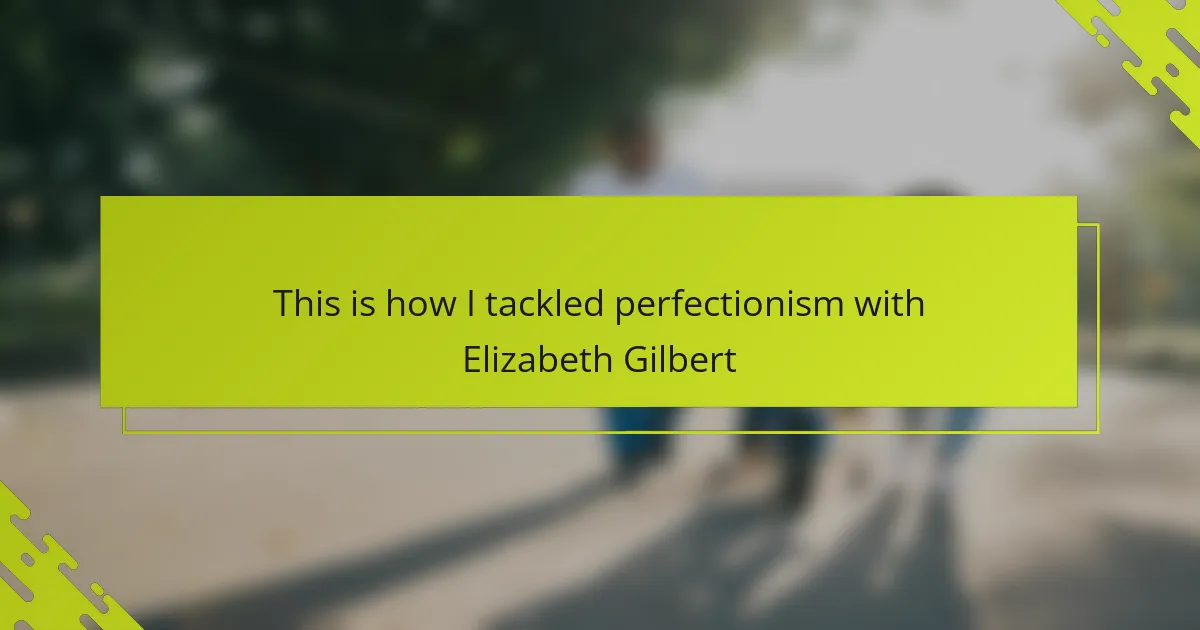Key takeaways
- Perfectionism in queer women often stems from societal pressures and the need to counteract stereotypes, leading to exhaustion and isolation.
- Elizabeth Gilbert suggests overcoming perfectionism by embracing curiosity and viewing creativity as a relationship rather than a performance.
- Practical steps to combat perfectionism include allowing oneself to start imperfectly and reframing self-judgment into a curious mindset.
- Building supportive communities is essential for fostering self-acceptance and relieving the pressure of perfectionism through shared experiences and vulnerabilities.
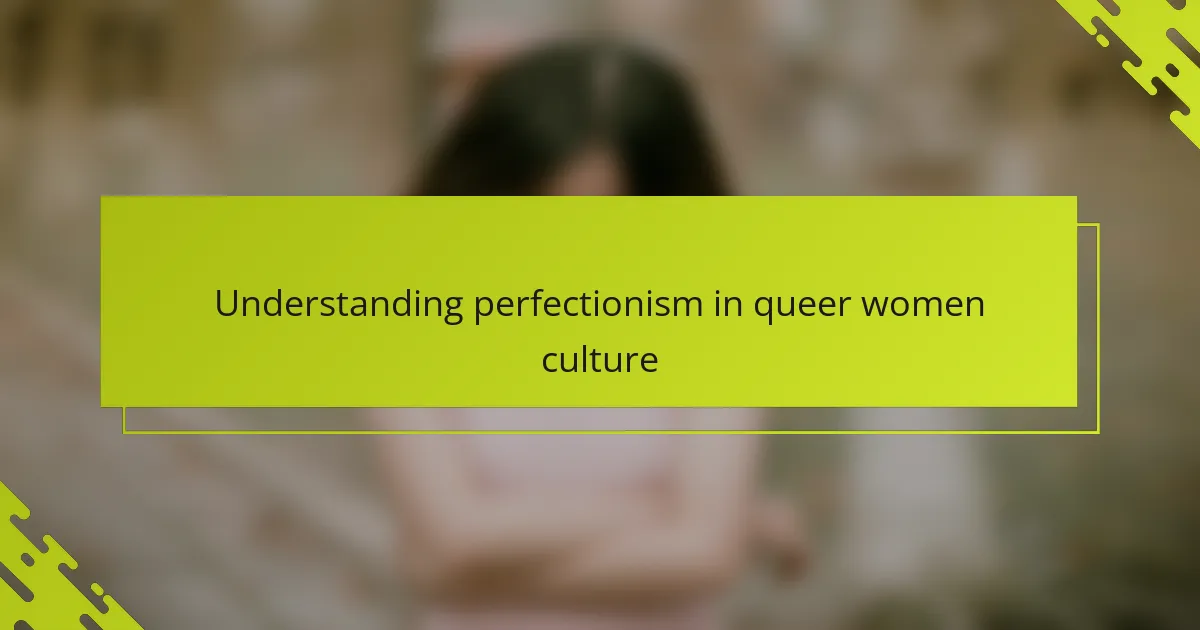
Understanding perfectionism in queer women culture
Perfectionism in queer women culture often feels like carrying a double weight — striving not only to excel but also to prove one’s worth in spaces that historically excluded us. Have you ever noticed how this drive isn’t just about doing things flawlessly but about surviving with dignity and visibility? From my experience, this can create an exhausting pressure to present an unblemished identity both internally and externally.
I recall times when I pushed myself too hard, convinced that any mistake might confirm negative stereotypes or lessen my sense of belonging. That fear of imperfection sometimes masked a deep yearning for acceptance and self-love, which felt just out of reach. Isn’t it ironic how the quest for perfection can actually make us feel more isolated within our communities?
Understanding this perfectionism requires empathy and patience—it’s rooted in complex histories and personal stories. When I think about how queer women are often negotiating between authenticity and societal expectations, it becomes clear that perfectionism is both a shield and a cage. How often do we pause to question whether this drive serves us or confines us?
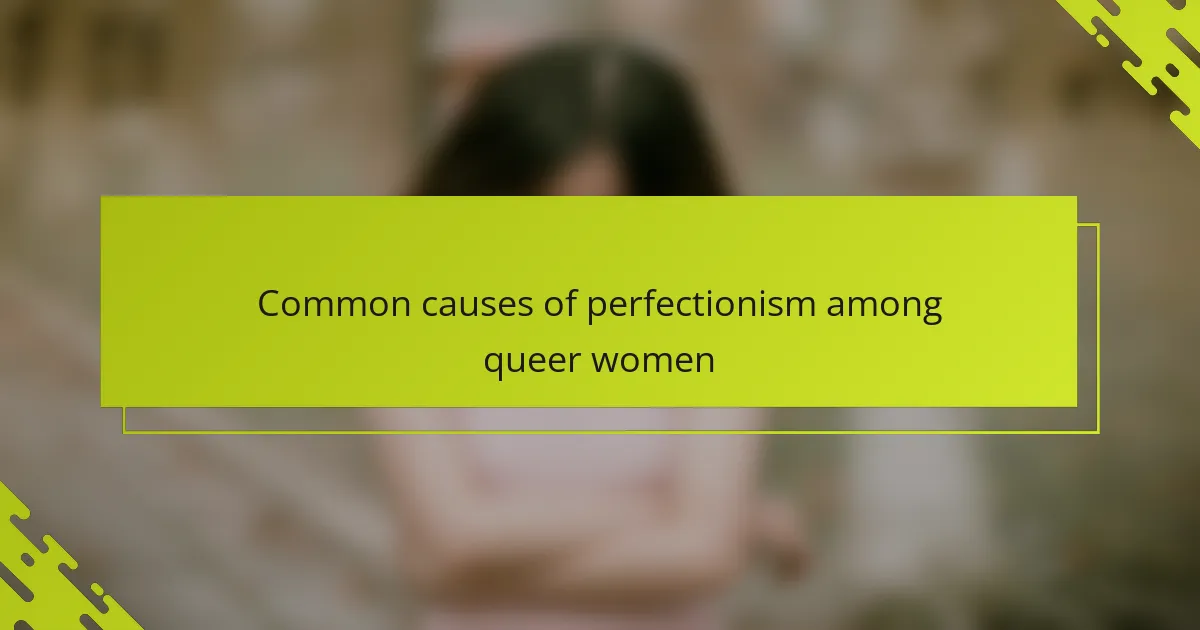
Common causes of perfectionism among queer women
One common cause of perfectionism among queer women is the pressure to counteract longstanding stereotypes. I’ve noticed how, growing up, every misstep felt amplified, as if it could fuel misconceptions about our intelligence or worth. It’s exhausting trying to appear flawless just to dismantle those biases, don’t you think?
Another factor I’ve seen is the internalized need to represent the community “correctly.” When you carry not only your own expectations but the weight of visibility for others, it’s easy to slip into perfectionism as a coping mechanism. I remember moments when I felt like any flaw wasn’t just mine—it reflected on everyone like an unwanted spotlight.
Then there’s the intersection of societal rejection and self-acceptance struggles that fuels this cycle. Queer women often face nuanced, layered pressures, from family to workplace to social circles, making perfectionism seem like a survival tool. Have you ever felt that being perfect might shield you from criticism, yet at the same time, it isolates you deeper? That tug-of-war is something I think many of us live with daily.
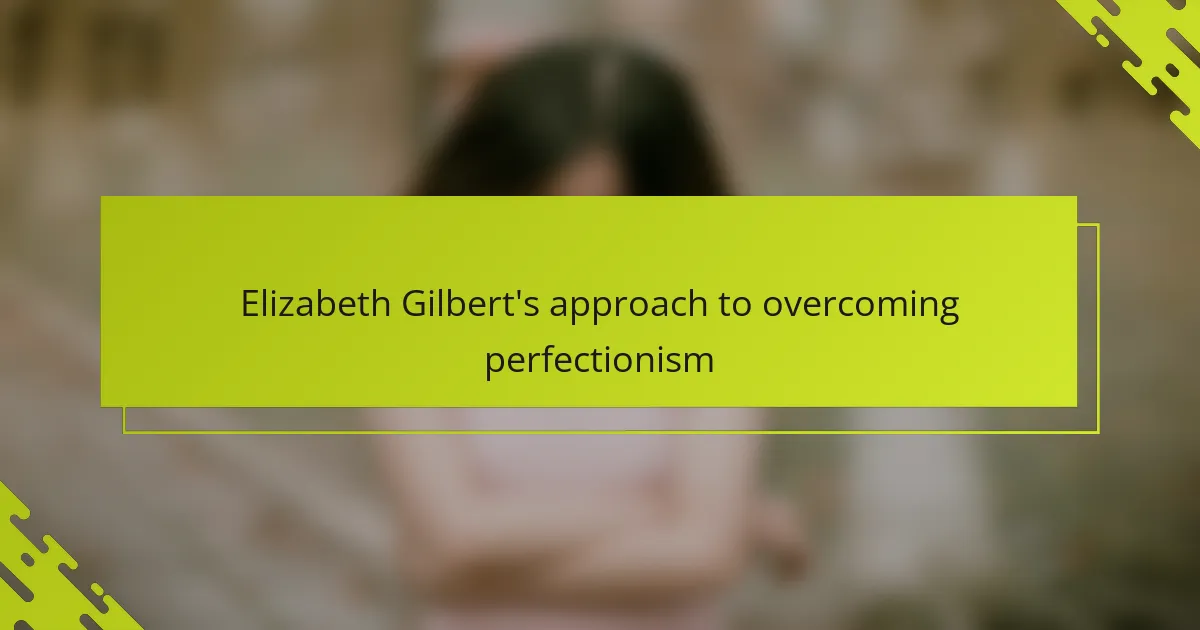
Elizabeth Gilbert’s approach to overcoming perfectionism
Elizabeth Gilbert’s way of overcoming perfectionism feels like a breath of fresh air when you’re caught in that relentless pursuit of flawlessness. She talks about shifting focus from an impossible ideal to simply showing up—even if what you create is messy or imperfect. Have you ever tried letting go enough to just start, without demanding every detail be perfect? I found this approach surprisingly freeing; it reminded me that progress beats paralysis.
She also encourages embracing curiosity over judgment, which struck me deeply. Instead of beating myself up for “not getting it right,” I began asking, “What can I learn here?” This subtle change in mindset made perfectionism feel less like a prison and more like a challenge I could explore with kindness. It’s like turning down the volume on that inner critic and tuning in to a gentler inner coach.
What I respect most is how Gilbert frames creativity as a relationship, not a performance. When perfectionism made me fear failing publicly, she reminded me that creative expression is about connection—not about proving something to others or myself. This shift, from striving to prove to simply sharing, eased a lot of the pressure. Have you noticed how approaching things this way fosters more joy and less anxiety? For me, it transformed not just my work but how I live with my imperfections.
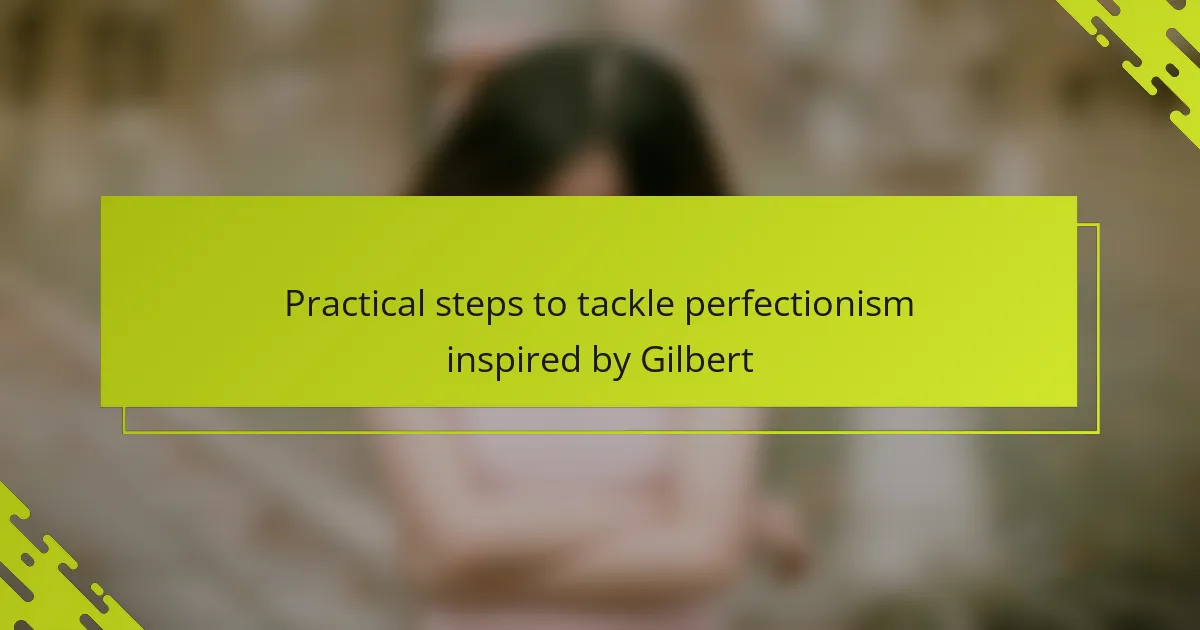
Practical steps to tackle perfectionism inspired by Gilbert
One practical step I took, inspired by Gilbert, was to give myself permission to start imperfectly. Instead of waiting for the “right moment” or flawless conditions, I simply showed up with what I had. Have you ever noticed how just beginning—even messily—can chip away at the paralyzing grip of perfectionism? That initial act of courage felt like reclaiming my creative freedom.
Another key move was shifting from harsh self-judgment to a curious mindset. Whenever I stumbled or felt outside my standard, I asked myself, “What is this trying to teach me?” This small change softened my inner critic and opened space for learning instead of shame. It was as if I’d turned down the noise of pressure and tuned into a voice of kindness that actually motivates.
Finally, I embraced Gilbert’s idea that creativity is a relationship, not a test to pass. When I stopped framing my efforts as performances meant to prove my worth, I felt immense relief. Do you find that when you focus on sharing your authentic self rather than achieving perfection, your anxiety eases and joy grows? For me, this shift didn’t just improve my work—it changed how I relate to my imperfect, evolving self every day.
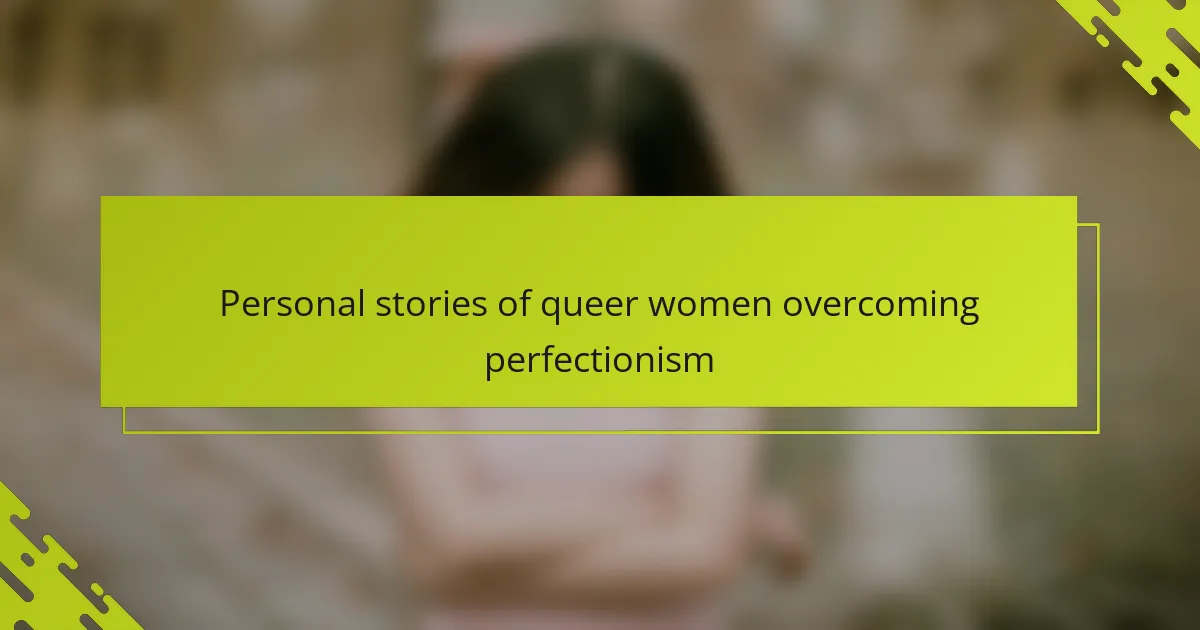
Personal stories of queer women overcoming perfectionism
I remember a close friend of mine, a brilliant queer artist, who used to obsess over every brushstroke as if her identity depended on it. When she finally embraced the idea that her worth wasn’t tied to flawless work, she started creating with a new kind of freedom. Have you ever felt that moment when the pressure lifts just enough to let your true self shine through?
Another story comes from my own experience, where I battled the need to appear perfect in my relationships and community roles. That constant strain left me feeling exhausted and disconnected until I realized that vulnerability could be just as powerful as perfection. Isn’t it liberating to recognize that showing up authentically—even with flaws—builds deeper connections?
One woman I admire openly shared how shifting her mindset from self-judgment to curiosity helped dismantle her perfectionism. Instead of fearing mistakes, she began asking, “What can this teach me about myself?” That simple question transformed her inner dialogue from harsh critique into gentle encouragement. Have you ever tried looking at your imperfections as invitations rather than failures?
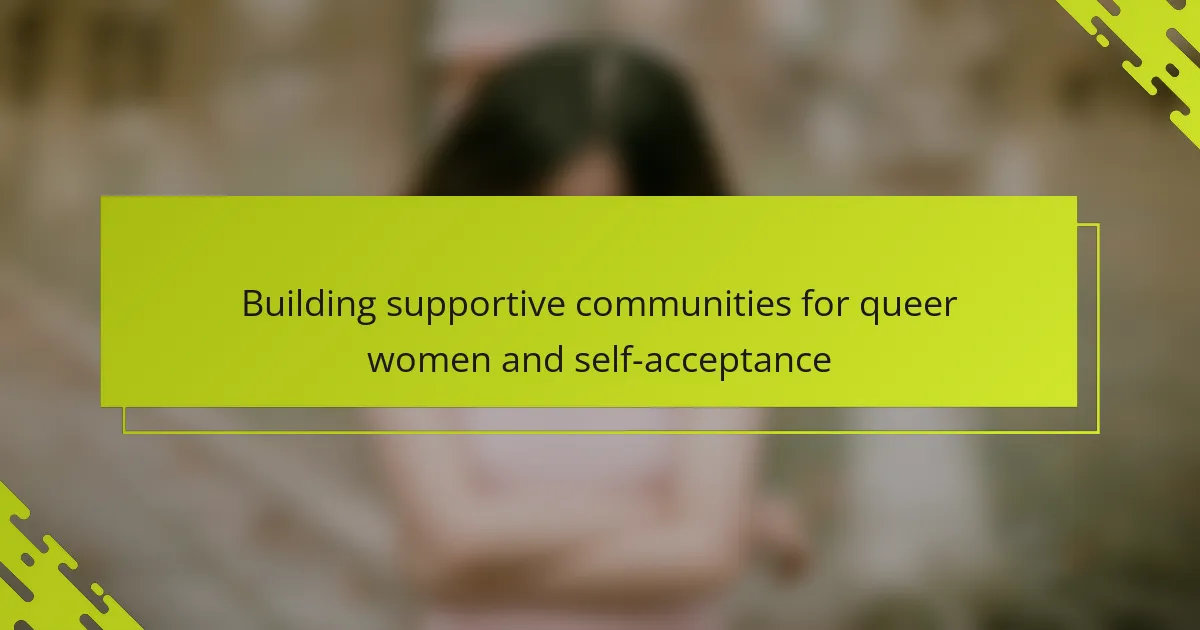
Building supportive communities for queer women and self-acceptance
Building supportive communities creates a vital space where queer women can shed the exhausting facade of perfectionism together. I’ve found that when we connect authentically—with no need for flawless masks—the relief and acceptance ripple through every part of our lives. Have you noticed how simply knowing you’re seen and valued as you are can soothe those deep, old worries about not being enough?
In these communities, self-acceptance grows not just from within, but through shared stories and mutual encouragement. I recall one gathering where a friend admitted her fear of never being “good enough,” and the room responded with empathy, not judgment. Moments like that remind me how powerful it is to learn from each other’s vulnerabilities—our imperfections become the very threads that weave us tighter together.
But building this kind of support takes intention. How often do we pause to create or seek out spaces where messiness and authenticity are not just allowed, but celebrated? From my experience, these affirming communities aren’t just comforting places—they’re essential catalysts for breaking free from perfectionism and stepping fully into our true selves.
